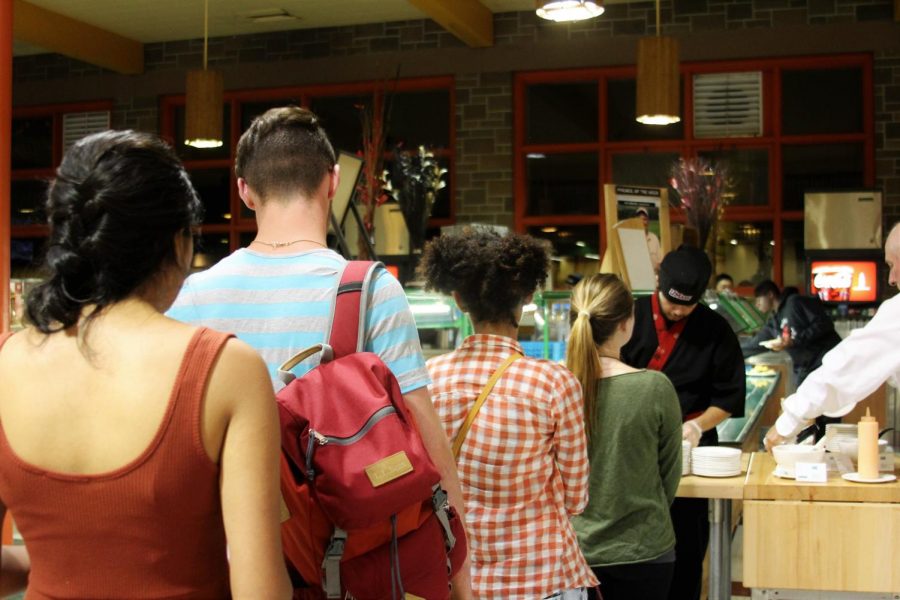We’ve all been there.
It’s 7:30 p.m. on a Friday. You and your friends decide to have a nice sit-down dinner at Worcester Dining Commons, blissfully ignorant of the glaring red banner on the University of Massachusetts Dining app that displays “busy.”
When you enter the dining hall, you are suddenly confronted by a serious problem: all the seats are taken.
Booths? Taken. Long tables? Taken. What about that small table over there? Upon closer examination, you see an assortment of UCards which unequivocally state that this table is indeed taken.
After repeating the phrases “Sorry, are you guys leaving?”and “Are you using this seat?”throughout various sections of the dining hall, your group finally decides to move an embarrassing number of chairs onto the far end of a long table.
Many of your friends will have to balance their plates on their laps. It is momentarily deemed a worthy sacrifice for the sake of stir fry, soft serve and watered-down soda.
In the face of disaster, you can always count on a few enterprising young students, freshly equipped with their ECON 103 knowledge, to step up with a solution.
Over the past few weeks, these students have banded together to do what economic students do best: apply their vastly general knowledge about supply and demand towards one highly unethical, exploitative goal.
The underground dining hall prospecting ring was born.
“I challenge you to find any sort of potential equity issue with this whatsoever,” says junior economics major and self-proclaimed ‘finance bro’ Olly Gopoli. “Liberal economic meddling from administration is what caused this deadweight loss in the first place.”
Yesterday at the crack of dawn, student prospectors flooded Worcester, turning the dining hall into a clamoring frenzy reminiscent of a 1980s New York Stock Exchange trading floor. They circulated around chairs, shouting values to each other and vigorously marking down stats on their clipboards.
Dowsing rods were inserted into the carpet to measure the quantity of crumpled napkins and saturation of spilled alfredo sauce per square meter of floor. Booths were considered valuable real estate. The wobbly small tables with hazardously tall chairs were considered second-class.
The seat market opened to the general public at 7:00 a.m. Hungry students looking for guaranteed seats sought out private investors, mostly from Isenberg School of Management, to outbid each other for table claims.
We spoke with one of the investors, freshman accounting major Margie Null, about the chaos caused by this new economy. “Don’t think this is some sort of ‘Wolf of Wall Street’situation. We are running a cold, heartless operation here.”
Our interview with Null was briefly interrupted by two other Isenberg students. They argued for a few minutes. One student was shaking a clipboard and repeatedly pulling his mask down below his nose to emphasize his frustration while the other spoke frantically on the phone to some unknown client.
The clipboard student cried “You charged 20 percent vig and all you managed to claim was a single counter seat? You can’t even fully extend your legs! You have to sit sideways!”
Null also commented on this. “Now we can be the private investors and hedge fund managers that we had always dreamed of becoming. This looks great on a resume. This is real world experience.”
Suddenly, a text notification appeared on Null’s phone screen.
“Speaking of investing, it looks like one of my clients fell through with their interest payments— again.” With a weary sigh, Null pulled a ski mask and a dented aluminum baseball bat from her backpack. “I guess it’s time for them to pay the piper, if you know what I mean.”
Director of Dining Services Ken Toong allowed us into his padlocked office for an interview after we confirmed that we were reporters and not lobbyists.
“I, Ken Toong, solemnly believe in the efficiency of markets,” said Toong as he read from a piece of paper prepared for him by his lawyer.
He looked over his shoulder multiple times. “The dining services administration will continue to take a laissez-faireapproach. Thank you. Goodbye.”
Freshman public health major and Worcester devotee Ryan Maynard thinks that table prospecting has had extremely positive results.
“This is the first time since coming here that I’ve been able to guarantee a seat for myself! No more hopelessly circling around the dining hall while my chicken parm gets cold,” says Maynard.
Sophomore business management major and Commonwealth Honors College student Yvonne Revenoo says “The University has given us no other choice. This is a cutthroat world of gains and losses after all.”
She slid a large, unmarked metal suitcase out from underneath her bed. “And I’m definitely obtaining my gains.
Kelly McMahan can be reached at [email protected].





















Varghese Jacob • Nov 6, 2021 at 6:01 am
As someone said in another article, UMass Amherst is accepting students more than it can accommodate and the physical campus area it has.
There are only two solutions – first further expand the campus (Mount Ida idea was a very good one) and secondly, all students (including freshmen) should be advised to enroll and mix into two types of courses – 50% on-campus and 50% online (UWW) courses. Not only this will reduce the total cost of a semester (on-campus and online are charged differently) and also there will be less footfall of students on the campus.
By the way, UMass Amherst administration should study Harvard University, on how their campus has expanded over years. Harvard is now spread over 209 acres. Harvard has bought plots, lands, and buildings over time in Massachusetts. HBS has expanded its physical part.